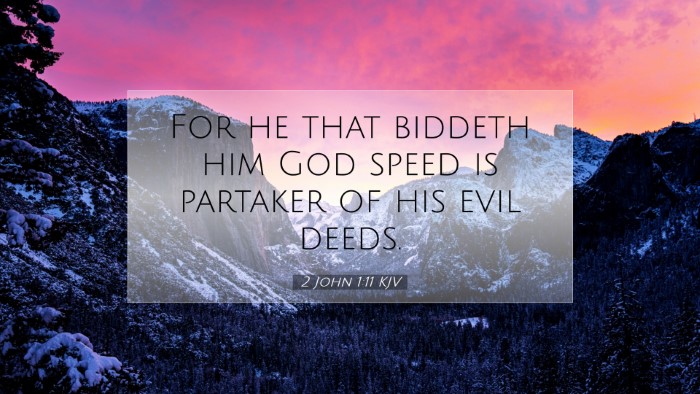Commentary on 2 John 1:11
2 John 1:11 reads, "For he that biddeth him Godspeed is partaker of his evil deeds." This brief yet profound verse encapsulates the essence of Christian fellowship and the serious consequences of supporting false teachings. The apostle John, in his capacity as a senior elder, admonishes his readers about the importance of discernment in their associations and affiliations.
Overview and Context
The second epistle of John is a personal letter addressed to 'the elect lady' and her children, which signifies the church. Throughout the letter, John emphasizes the necessity of truth and love, contending against the rising tide of false doctrine, specifically Gnosticism, which challenged the nature of Christ. This verse is a concluding exhortation that underscores the necessity of guarding the truth.
Theological Implications
John's statement serves as a stark warning regarding the nature of Christian fellowship:
- 1. The Nature of God's Approval: By stating that he who extends greetings to a false teacher is a participant in their evil deeds, John emphasizes that our approval must align with God's standards. Any endorsement of falsehood compromises one's own integrity and spiritual health.
- 2. The Call to Discrimination: Believers are called to practice discernment in their associations. Not all who come in the name of Christ are of Christ. This principle was crucial in the early church and remains essential today.
Insights from Matthew Henry
Matthew Henry notes that this verse serves as a decisive warning against the hospitality extended to false prophets. He emphasizes the communal responsibility of the church in protecting the truth:
- Henry’s Key Observations:
- Hospitality was a vital aspect of early Christian practice, yet it was to be extended judiciously.
- By aiding or expressing goodwill towards a false teacher, one implicitly endorses their errors and is accountable for the harm these teachings may cause.
Insights from Albert Barnes
Albert Barnes expounds on the implications of 'Godspeed' in the cultural context of the time, where the term signified not just a greeting but also an endorsement of one’s activities:
- Barnes’ Contributions:
- To wish someone success in their endeavors, especially in misleading others, is both a tacit agreement and an act of complicity.
- Barnes calls attention to the critical need for vigilance amongst believers to preserve the integrity of the faith against deceptive influences.
Insights from Adam Clarke
Adam Clarke offers a pastoral perspective on this verse, reflecting on the relational dynamics of Christian fellowship:
- Clarke’s Thoughts:
- Friendship and community are vital; however, maintaining purity in these relationships is paramount.
- Clarke emphasizes that in love and truth, separation from falsehood is as critical as the call to love others.
Practical Applications
For pastors, theologians, and students of the Bible, here are several takeaways from 2 John 1:11:
- Cultivating Discernment: Develop a robust framework for assessing teachings and leaders, rooted in Scripture.
- Encouraging Accountability: Foster environments in the church where leaders hold one another accountable for doctrinal integrity.
- Promoting Truth and Love: Balance the call to love others with a commitment to truth; fellowship should not come at the cost of sound doctrine.
Conclusion
The verse 2 John 1:11 challenges believers to consider the implications of their affiliations and endorsements. In a time where truth is often diluted, the message that John conveys remains relevant. As the body of Christ, believers are urged to be vigilant, foster biblical discernment, and maintain the sanctity of their faith community by upholding the truth of the Gospel while embodying Christ-like love.


